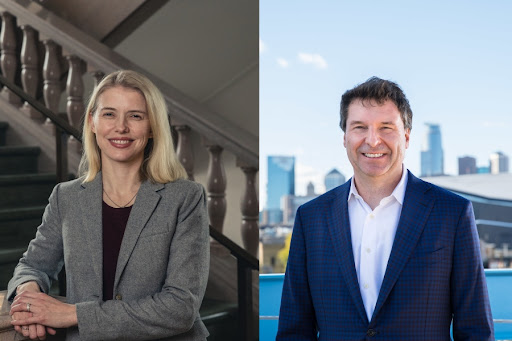
Corporate leaders, including the CEOs of Amazon and Meta, are pushing for their employees to return to the office by mandating in-person work policies. However, the shift away from fully remote work has been met with resistance by some employees.
Carlson School of Management faculty members have been examining this multifaceted issue. Professor Colleen Flaherty Manchester studies workplace policies, including flexible work arrangements, and Professor Myles Shaver is an expert in corporate strategy. Both can speak to factors fueling the flex work discussions.
Colleen Flaherty Manchester, PhD
“There’s quite a bit of variation on why employees might want different work arrangements. However, it’s easier from a managerial perspective to have a one-size-fits-all policy. Policies are easier to implement and monitor on an organizational level, but they don’t necessarily meet the needs on an individual employee level.
“Oftentimes, we find that the reasons employees want remote work arrangements can be grouped into two main categories: to be more productive and to address personal needs or demands. While employees often see remote work arrangements as checking both boxes, managers tend to see it as one or the other. Those manager attributions—judgments on perceived causes of an action or behavior—can influence outcomes for employees. In research done prior to the pandemic, we show that managers tend to perceive workers who have a remote work arrangement for personal reasons as less committed and less worthy of career rewards and advancement. That continued potential for misalignment between employees and managers is where we’re likely seeing some friction in recent discussions over return-to-office policies.”
Myles Shaver, PhD
“Much of the return-to-office conversation has reduced the benefit of being in the office to monitoring employees. In my opinion, that’s the wrong conversation to have. There is something we miss when we’re not in the office, and that is serendipity—unplanned interactions with co-workers. It’s hard to see, but it’s important for a lot of jobs.
“The structured environment of Zoom meetings often loses out on the spontaneous moments that could lead to innovative breakthroughs. Being in-office allows for the serendipity of running into a co-worker from a different department and launching into a conversation that answers the question you’ve been stuck on for weeks.
“It’s important to note that in-office and flexibility aren’t necessarily opposites. But if flexibility is defined that you never come into the office, then that’s where employees might lose out on those career-changing opportunities and organizations might competitively suffer compared to peers who have returned to the office.”
Colleen Flaherty Manchester is a professor in the Work and Organizations department and is the Board of Overseers professor at the Carlson School of Management. Her research investigates workplace practices, including benefits and policies, implemented by employers and their effects on the careers of workers, including differences by gender and caregiving role. Research areas of interest include incentives, flexible work policies, human capital investment, and retirement policies.
Myles Shaver is a professor and the Curtis L. Carlson chair in corporate strategy in the Strategic Management and Entrepreneurship department at the Carlson School of Management. His research about corporate expansion has been published in leading scholarly journals and his work regarding the Minneapolis-St. Paul headquarters economy has helped guide talent attraction and retention initiatives in the region.
- Categories:
- Business and Management
- Work





